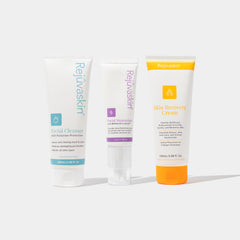We all know that sunburns aren’t good for us – and we know that sun damage can lead to skin cancer down the road. But, why don’t we take it more seriously? Are sunburns and other types of sun damage as dangerous as they tell us? Should we be heeding the warnings more closely? We’ll take a look at this and a couple of questions in this blog: how do sunburns cause cancer and what happens when you get a sunburn?
So, What Happens When You Get A Sunburn?
As you probably already know, the sunlight we know and love isn’t just visible light. There are also tons of ultraviolet waves of literal radiation that we can’t see. The Earth’s atmosphere blocks highly-damaging UVC radiation, but UVB and UVA rays still get through. You can read more about the differences here.
When our skin is exposed to too much radiation, our skin cells’ DNA becomes molecularly damaged. Now, cells naturally can tell when they’ve been subject to DNA damage, so sunburned skin cells then call for an immune response to the area and then go through apoptosis (intentional cell death) to avoid replication issues.
So, the swelling and pain from a sunburn come directly from confused, scrambled cells rupturing and being consumed by immune system cells. This is interesting to read about – but very bad for our skin.
What Are The Different Degrees of Sunburns?
First-Degree Sunburns
Most of us have had a first-degree sunburn at some point. First-degree sunburns are characterized by reddened, swelling, sometimes itchy skin (in people with darker skin tones, redness won’t be as prominent), skin that is warm to the touch, and skin that flakes after a few days. First-degree sunburns usually resolve in a week or less but can be pretty painful in the meantime. (So make sure you’re resisting the urge to scratch!)
Pro Tip: Use our Skin Recovery Cream to help the damaged skin bounce back, keep it hydrated, and soothe the itchiness of sunburns!
Second-Degree Sunburns
Second-degree sunburns are a whole different beast. You’ll usually see blistering, deep red patches (or darker patches on darker skin tones), skin that looks wet or shiny, and odd discoloration of the skin. Heat stroke and heat exhaustion are sometimes seen in conjunction with second-degree sunburns, too, making it critical to seek medical attention.
These types of burns may take several weeks to heal, depending on how well a patient takes care of their skin during this time.
Are There Other Types of Sun Damage?
You’re probably also already aware of some of the other types of skin damage, such as premature aging, discoloration, sun spots, and melasma. Most of these are a result of sunburn and can be avoided with proper skincare in the sun.
Can Sunburns Cause Skin Cancer Later on in Life?
“The recall of painful sunburns before the age of 20 y was associated with an increased risk of squamous cell carcinoma…” - 2003 Study
As we mentioned above, sunburn causes cell death due to DNA scrambling. Our bodies are pretty good at eliminating cells with faulty DNA, but they can miss one or two out of millions. Furthermore, some people are predisposed to certain types of cancers due to genetics— some of us have an altered tumor-suppressing gene (the internal trigger responsible for signaling apoptosis).
Whether by chance (a numbers game) or because of genetics, all of that scrambled DNA poses a serious problem – either today or ten years from now.
How Do I Prevent Sunburns?
We don’t need to go into detail on this point. We all know that we need to use and reapply sunscreen (especially mineral sunscreen on the face) regularly to block those pesky UV rays. However, wearing protective clothing can also help. Long sleeves, hats, and sunglasses can all help protect our skin from the sun’s damaging rays.
Stay Protected With A Sun Care Routine
Despite our best efforts sometimes, sunburns still happen. Or even if you avoid this type of itchy, uncomfortable sun damage, days at the beach, in the pool, or out in the sun in general can leave our skin feeling rather parched.
That's why Rejuvaskin created our own Sun Care Routine: combining the protection of SPF and nourishment of our recovery cream!
☀️ Learn More about the benefits of a Sun Care Routine →





















Leave a comment